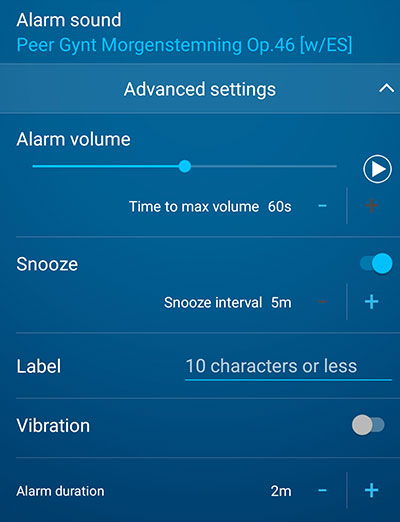How do you want to wake up?
This is a very personal story. But this blog author is not a morning person.
However, I don’t like to be woken up by a loud alarm. I am a person who want to be woken up gently if possible.
Some people are very much the same as me, so I’d like to let you know my recommended alarm settings. I hope this will be helpful.
The key is “the time to reach the maximum volume”.
Here is my alarm settings I often use.

First, set the alarm sound. My current favorite alarm sound is “Peer Gynt Morgenstemning Op. 46 [w/ES]”, which is available on the app. It is a well-known classic that creates a fresh morning feeling.
Second, set the alarm volume you expect to wake up and change “Time to max volume” to 60 seconds. The alarm sound itself fades in a bit, but we want it to fade-in even further. With the alarm sound described above, the volume will reach maximum just before the sound picks up.
Third, turn the vibration off because I don’t want to wake up to a vibrating alarm after a great sound.
Don’t forget to change the alarm duration
And finally, don’t forget to change the alarm duration to 2 minutes, since it takes 1 minute to reach the maximum volume. We guess you don’t want the alarm to stop when the volume reaches maximum. If you are worried about this, you can set the duration a little longer.
Personally, I can wake-up easier with this alarm settings. I set a snooze just in case, but most of the time I wake up without using the snooze.
This is off topic, but…
“Peer Gynt” is a play written by the Norwegian dramatist Henrik Ibsen published in 1867. The story is about a man named Peer Gynt who dreams of getting rich quickly and starts a journey. The Norwegian composer Edvard Grieg was in charge of the music for this play at the request of the author.
Although Suite No. 1 “Morning Mood”, which was later revised, is known today, it is based on the play’s Op. 23: No. 13, Prelude to Act IV “Morning Mood”.
This song, which is familiar in Japan, evokes an image of a refreshing morning in Norway. However, in the play, it is the scene of the morning that the main character Peer greeted in the Sahara Desert of Morocco. Moreover, this is the worst scene that all his treasure has been stolen when Peer woke up in the morning and he is left alone in the Sahara Desert.
Why was that refreshing music applied to such a scene?
There are various theories, such as that Grieg had never seen the Sahara Desert, or that it reflects the mind of Peer, who is broken.






